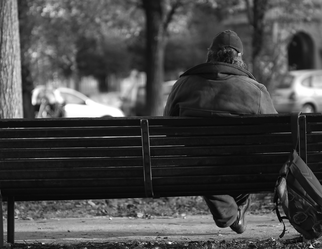|
By: Daniel Gantner, AmeriCorps State & National Member In our modern world, un-housed citizens continually suffer from a lack of access to food, health care, and social services. Due to this lack of access, they are at a higher risk of developing serious health conditions, both physical and mental. On top of all of this, people experiencing homelessness routinely deal with explicit criminalization in their everyday lives. Homeless criminalization not only makes it incredibly difficult for unhoused people to live, but it also ensures that many will be trapped in a seemingly endless cycle of poverty, incarceration and forced relocation.
According to the National Coalition for the Homeless, the criminalization of homelessness “refers to measures that prohibit life-sustaining activities such as sleeping/camping, eating, sitting, and/or asking for money/resources in public spaces” (NCH). These measures manifest themselves in sweeps of homeless encampments where tents, medications and other personal items are confiscated or destroyed by local police forces (NCH). They also include ordinances that make it illegal for people to request money, and in some cases, even prohibit sharing food with homeless people (NCH). These laws often aim to “clean up” the image of a particular city or town by simply moving homeless people out of sight. For example, in 2022, New York City arrested over four hundred homeless people for “being outstretched” and taking up more than one seat on a train or bus (Heyward). Unsurprisingly, criminalizing the lifestyles of people experiencing homelessness exacerbates the problem far more than it fixes it. For instance, having a criminal record in addition to not having a permanent address makes it incredibly difficult for unhoused citizens to find employment and housing, and often makes them ineligible for social services (NCH). Further, sending them to jail overburdens our already overpopulated criminal justice system. The punishment they unjustly receive for “crimes” costs more than finding them temporary housing, often up to three times as much (NCH). In some cities, the government will even go so far as to give people one way bus tickets to other states in attempts to cut down their homeless population. According to The Guardian, “people are routinely sent thousands of miles away after only a cursory check by authorities to establish they have a suitable place to stay once they get there. Some said they feel pressured into taking tickets, and others described ending up on the streets within weeks of their arrival” (The Guardian). Despite the immediate financial and social drawbacks of criminalizing homeless populations, cities all across the country choose to prioritize the immediate physical appearance of the city over the lives of the actual people who live there. Issues related to the ongoing criminalization of homelessness make it clear that law enforcement is not an effective tool to solve this challenge, as it instead perpetuates the cycle of homelessness and poverty. The current “solutions” of forcefully relocating or throwing un-housed citizens into the criminal justice system not only dehumanizes them, but further upholds the stigma that they are criminals. In order to effectively help people experiencing homelessness, our government must focus on providing them tangible relief and services in order to create better lives for themselves. References: Heyward, Giulia (2022, November). NYC Mayor Adams faces backlash for move to involuntarily hospitalize people. Retrieved from www.npr.org/2022/11/30/1139968573/nyc-mayor-adams-faces-backlash-for-move-to-involuntarily-hospitalize-homeless-pe Outside in America team (2017, December). Bussed out. www.theguardian.com/us-news/ng-interactive/2017/dec/20/bussed-out-america-moves-homeless-people-country-study NCH Civil rights. nationalhomeless.org/issues/civil-rights/
0 Comments
Leave a Reply. |
BLogArchives
July 2024
Categories |
©2022 Chicago HOPES for Kids. All Rights Reserved.
Website by Gumbo Media
Website by Gumbo Media


 RSS Feed
RSS Feed
